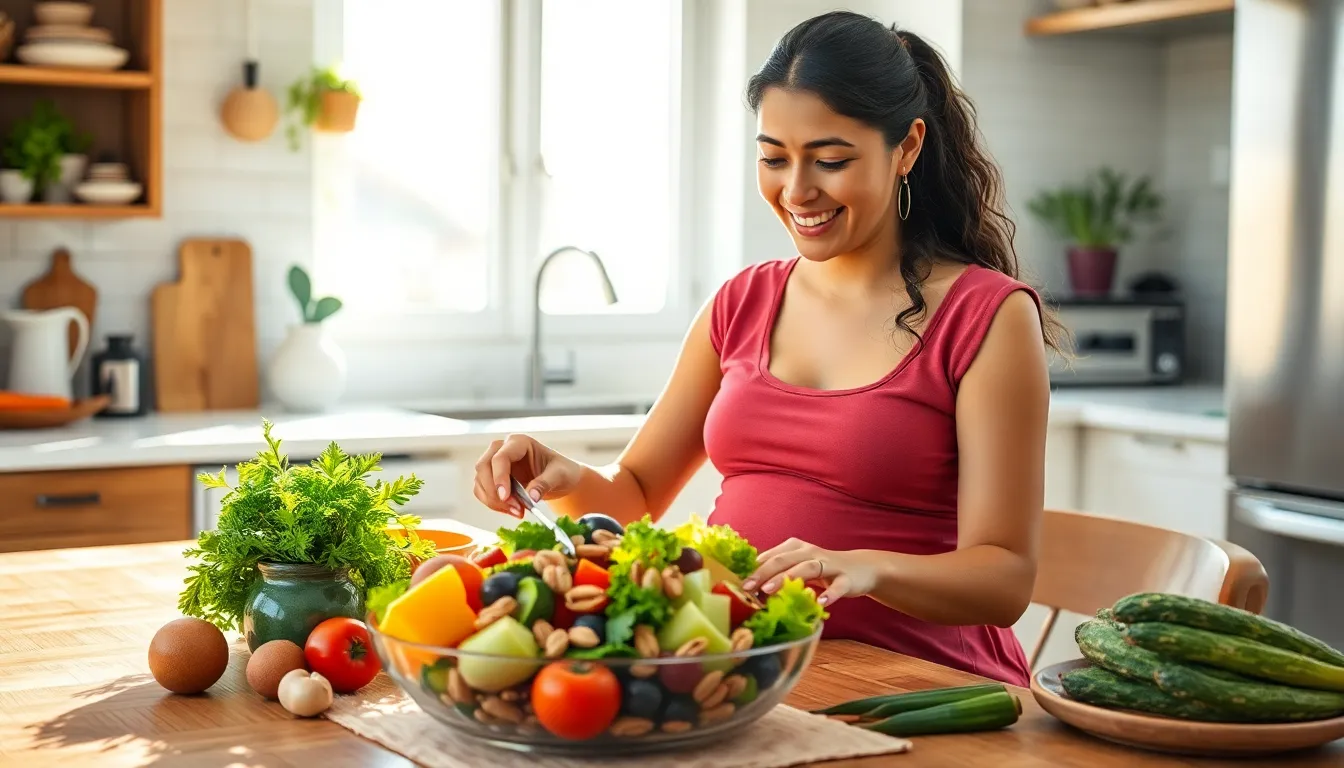Pregnancy is a wild ride, filled with cravings that can turn a salad lover into a pizza enthusiast overnight. As the body undergoes incredible changes, what’s on the menu becomes crucial. It’s not just about eating for two; it’s about fueling both mother and baby with the right nutrients. The right pregnancy eating habits can make all the difference in that journey.
Table of Contents
ToggleImportance of Healthy Pregnancy Eating Habits
Healthy eating habits during pregnancy play a crucial role in the well-being of both the mother and the developing baby. Nourishment extends beyond personal preference; it supports fetal growth and development. Essential nutrients like folate, iron, and calcium significantly influence the baby’s health.
Eating a balanced diet helps prevent pregnancy complications such as gestational diabetes and preeclampsia. These conditions can arise from poor dietary choices. Consuming whole foods, fruits, and vegetables contributes to better outcomes for mother and child alike.
Regular intake of protein supports the development of the baby’s tissues and organs. Incorporating healthy fats, such as omega-3 fatty acids, promotes brain development. Each food choice can shape the pregnancy experience and influence the baby’s health long-term.
Hydration also plays an important role in pregnancy nutrition. Drinking sufficient water aids in digestion and helps prevent fatigue. Ensuring a healthy weight during this period relies heavily on maintaining nutritious eating patterns.
Engaging in mindful eating encourages awareness of hunger cues and fullness signals. It’s beneficial to listen to the body’s needs and respond accordingly. Following these healthy habits establishes a foundation for postpartum recovery and enhances the overall experience of pregnancy.
Nutritional Needs During Pregnancy

Nutrition plays a crucial role during pregnancy. Focusing on nutrient-rich foods supports both mother and baby.
Essential Vitamins and Minerals
Folate is vital for fetal development, helping to prevent neural tube defects. Calcium supports bone health, ensuring strong skeletal development in the baby. Iron is necessary to increase blood volume and prevent anemia, a common concern during pregnancy. Vitamin D promotes calcium absorption and supports immune function. Additionally, vitamin C enhances iron absorption and aids in the development of connective tissues. Including a variety of fruits, vegetables, whole grains, and lean proteins provides these essential vitamins and minerals. Many experts recommend prenatal vitamins to bridge any potential gaps in nutrition.
Macronutrient Requirements
Carbohydrates supply energy for both mother and baby, forming the base of a healthy pregnancy diet. Proteins promote tissue growth and are essential for muscle and organ development. Aim for quality protein sources such as beans, nuts, and lean meats. Healthy fats contribute to brain development and overall growth, making nuts, avocado, and olive oil excellent choices. A recommended macronutrient distribution includes 45-65% carbohydrates, 20-35% fats, and 10-35% protein. Tracking intake can ensure a balanced approach to meet the body’s demands during this transformative phase.
Foods to Include in Your Diet
A nutritious diet plays a key role during pregnancy. Specific food groups provide essential nutrients for both mother and baby.
Fruits and Vegetables
Fresh fruits and vegetables offer vital vitamins and minerals. Leafy greens, like spinach and kale, are high in folate, supporting neural development. Berries provide antioxidants, which combat oxidative stress. Bananas and oranges not only enhance energy levels but also deliver potassium and vitamin C, respectively. Incorporating a colorful variety ensures broad nutrient intake, enhancing overall health.
Whole Grains
Whole grains such as brown rice, quinoa, and oats supply necessary carbohydrates and fiber. Fiber aids in digestion and helps prevent constipation, common during pregnancy. These grains also provide B vitamins, which support energy metabolism. Choosing whole grain bread over white bread can significantly boost nutrient density. Consistent consumption of whole grains supports sustained energy levels throughout the day.
Protein Sources
Lean proteins are essential for tissue growth and repair. Chicken, turkey, and fish serve as excellent choices, providing iron and omega-3 fatty acids. Legumes like lentils and beans are also rich in protein and fiber, ensuring a balanced diet. Incorporating tofu and dairy products can further enhance protein intake while offering calcium. Prioritizing a variety of protein sources supports healthy fetal development and overall maternal well-being.
Foods to Avoid During Pregnancy
Certain foods and beverages can pose risks during pregnancy. Awareness of these can help ensure both maternal and fetal well-being.
Risky Foods and Beverages
Undercooked or raw seafood can harbor harmful bacteria and parasites, increasing the risk of foodborne illness. Raw or partially cooked eggs carry the risk of Salmonella, thus avoiding dishes that contain them is prudent. High-mercury fish such as shark, swordfish, and king mackerel should not be consumed due to their toxic effects on fetal development. Unpasteurized dairy products might contain Listeria, leading to severe complications. Processed meats, especially deli meats, require caution as they may also harbor Listeria. Alcohol consumption is not safe, as it can lead to fetal alcohol spectrum disorders.
Food Safety Tips
Maintaining food safety is crucial during pregnancy. Always wash hands with soap and water before handling food. Keeping fruits and vegetables clean helps eliminate potential contaminants. Pregnant individuals should cook meats thoroughly, ensuring they reach safe internal temperatures. Storing leftovers promptly prevents bacterial growth. Seeking pasteurized products, especially dairy, provides an extra layer of safety. Using separate cutting boards for raw meats and other food items prevents cross-contamination. Following these tips significantly reduces foodborne illness risk.
Maintaining healthy eating habits during pregnancy is vital for both the mother and the developing baby. By focusing on a balanced diet rich in essential nutrients and mindful eating practices, mothers can enhance their overall experience and support fetal growth.
Incorporating a variety of whole foods while avoiding harmful substances ensures a safer pregnancy journey. Staying informed about nutrition and food safety can empower mothers to make choices that benefit their health and their baby’s development. With the right approach to eating, pregnancy can be a fulfilling and nourishing experience.



